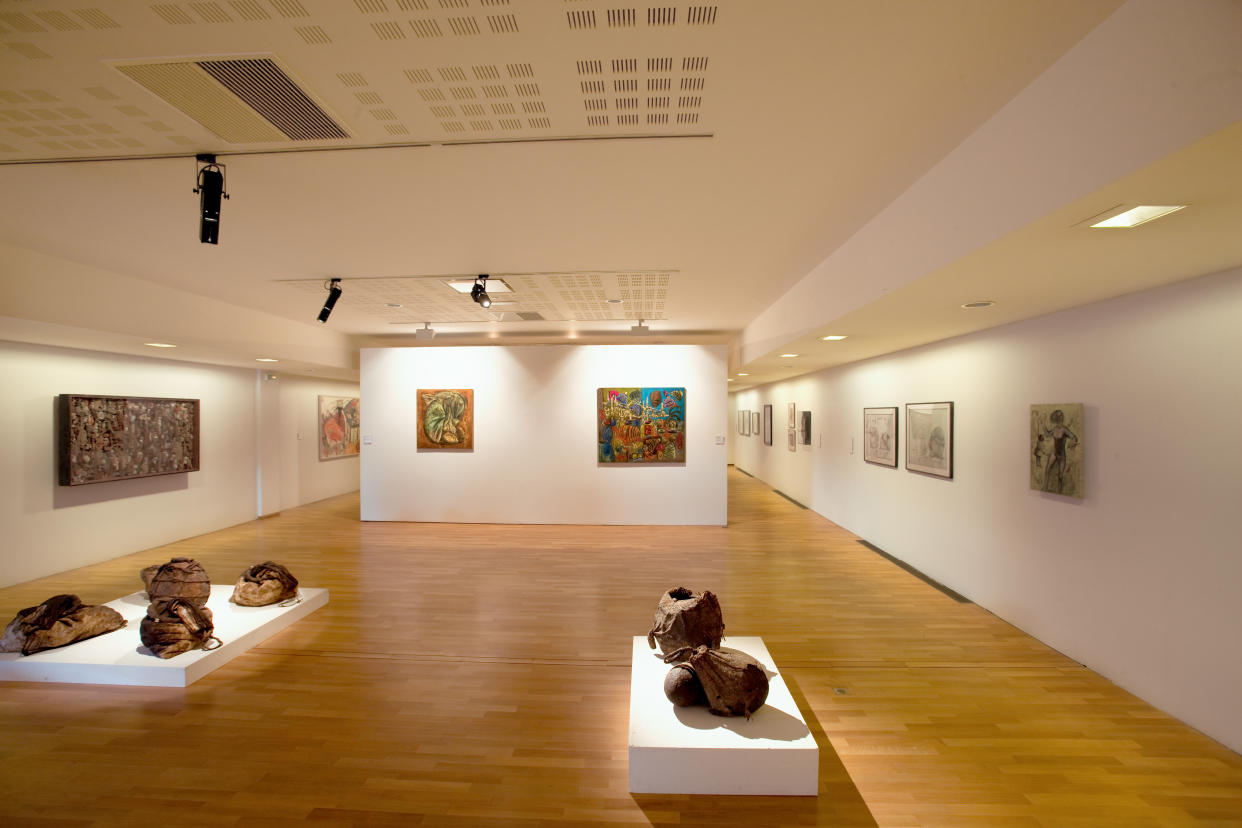We independently evaluate the products we review. When you buy via links on our site, we may receive compensation. Read more about how we vet products and deals.
Shuttered by coronavirus, museums offer unexpected help: 'This is all hands on deck'

Although museums nationwide have closed their doors amid the coronavirus crisis, they have found a surprising way to provide valuable resources in the fight against the pandemic. Shuttered institutions have tapped their reserves of respirators, face masks and gloves — everyday protective gear that keep artists, and their work, safe — and are donating those items to supplement the emergency shortage of medical supplies, Yahoo Lifestyle has learned.
The shortage — caused by mounting COVID-19 diagnoses, tariffs and a decline in Chinese imports — has forced medical institutions into dire straits: Doctors are recycling masks (that are sometimes expired) or forgoing protective gear, posing harm to themselves and patients while some turn to eBay to purchase hospital gowns. “We are at war with no ammo,” a Fresno, Calif., surgeon told the New York Times. The hashtag #GetMePPE (an acronym for personal protective equipment) is used by medical staff to flag their needs.
The crisis is a surprising battle cry for the art world, a “non-essential” industry that closed during the national shut-down. Galleries and museums are quickly emptying stockrooms filled with booties (shoe covers), respirators, face masks and nitrile gloves for hospital donations. The items are standard for art handlers who deliver and install pieces which emit dust and debris, and to protect pieces and artifacts from scuff marks and fingerprints when employees install works or hang paintings.
Related Video: Museums Around the World Are Sharing Zen Art on Social Media
In New York City, the Museum of Modern Art (MoMA) donated almost 3,000 nitrile gloves to Mount Sinai and New York Presbyterian/Columbia University Medical Center and 300 N95 masks to NYU Langone. Contemporary art center MoMA PS1 also sent 5,000 nitrile gloves to Montefiore Medical Center and New York Presbyterian. The Whitney Museum of American Art sent 6,200 gloves, 10 N95 masks, one case of booties and 11 Tyvek suits (disposable head-to-toe coverings) to Columbia University Medical Irving Center
Los Angeles’s The Broad donated nitrile gloves, booties, and N95 masks to the Good Samaritan Hospital, the city’s Getty Museum sent thousands of gloves and hundreds of masks to UCLA Health, and The Durham Museum in Omaha, Neb., delivered masks and gloves to the University of Nebraska Medical Center.
“There has never been a more important time,” Jill Dunne, director of marketing and communications at Ohio’s Cincinnati Art Museum, which sent 1,700 pairs of gloves and 160 masks to Mercy Health, tells Yahoo Lifestyle. “This is all hands on deck.”
The efforts are virtually unprecedented, although Louise Mirrer, the president and CEO of the New-York Historical Society (which sent 50 boxes of gloves to Weill Cornell Medicine) tells Yahoo Lifestyle that during World War II, the museum and library converted galleries to surgical dressing stations where 4 million bandages were made and sent to the Red Cross stations abroad.
Meanwhile, New York artists Shabd Simon-Alexander and Camille Henrot started the idea for Mask Crusaders, a resource for artists to list protective wear and either deliver or schedule pickups to hospitals. Since the group started in New York this week, it placed more than 3,000 supplies in the first 24 hours and has spread to eight other cities including Seattle, Chicago, Philadelphia and Los Angeles. The group primarily serves medical workers but mail carriers and “anyone else keeping society running” are welcome recipients.
“A motorcycle group even volunteered to deliver supplies to an underfunded hospital in Queens,” Simon-Alexander, an artist and community organizer, tells Yahoo Lifestyle. On Saturday, she will train volunteers, most strangers, in 20 different cities to get local groups going.
“Artists see a unique ability to address this need, but it’s frustrating that it lands on the shoulders of those largely impacted by a pandemic,” she says. “Artists are vulnerable because many aren’t eligible for government support if they don’t have wage jobs. And yet they’re stepping up.”
Simon-Alexander hopes the group is short-lived, if only so hospitals get necessary federal funds. On Thursday, the U.S. Senate approved a $2 trillion stimulus package that in addition to providing aid to individuals and businesses, would fund hospitals.
“In the meantime,” says Simon-Alexander, “We don’t want people to die.”
For the latest coronavirus news and updates, follow along at https://news.yahoo.com/coronavirus. According to experts, people over 60 and those who are immunocompromised continue to be the most at risk. If you have questions, please reference the CDC and WHO’s resource guides.
Read more from Yahoo Lifestyle:
Woman, turning 100, gets 'Happy birthday' serenade from loved ones through window at nursing home
How to stay positive in a negative news cycle: 'We are in this together'
Follow us on Instagram, Facebook, Twitter and Pinterest for nonstop inspiration delivered fresh to your feed, every day


